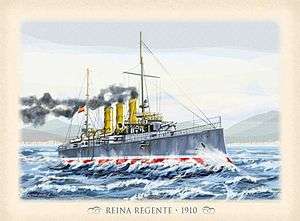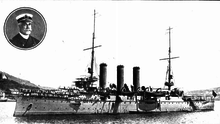Spanish cruiser Reina Regente (1906)
 | |
| History | |
|---|---|
| Name: | Reina Regente |
| Ordered: | 1896 |
| Laid down: | 1899 |
| Launched: | 20 September 1906 |
| Commissioned: | 1908 |
| Fate: | Scrapped, 1926 |
| General characteristics | |
| Type: | Protected cruiser |
| Displacement: | 5,287 t (5,203 long tons) |
| Length: | 102.71 m (337.0 ft) |
| Beam: | 16.12 m (52.9 ft) |
| Draft: | 6.06 m (19.9 ft) |
| Propulsion: | 2 triple expansion engines |
| Speed: | 20 knots (37 km/h; 23 mph) |
| Crew: | 497 |
| Armament: |
|
| Armor: |
|
Reina Regente was a protected cruiser built for the Spanish Navy in the 1900s, the only member of her class. She had a very lengthy construction period, being laid down in 1899, launched in 1906, and finally completed in 1908. The last cruiser built in Spain for nearly twenty years, she was armed with a battery of ten 5.5-inch (140 mm) guns and was capable of a top speed of 20 knots (37 km/h; 23 mph). Reina Regente's career was uneventful, the result of limited naval budgets and Spain's neutrality during World War I. In the early 1920s, she was employed as a training ship until she was discarded in 1926.
Design

Reina Regente was 102.71 meters (337.0 ft) long, and she had a beam of 16.12 m (52.9 ft) and a draft of 6.06 m (19.9 ft). She displaced 5,287 metric tons (5,203 long tons). Powered by a pair of triple expansion steam engines rated at 15,000 indicated horsepower (11,000 kW), the ship was capable of a top speed of 20 knots (37 km/h; 23 mph). Her coal-fired boilers, the number of which and their type are not known, were trunked into three funnels. She had a coal storage capacity of 1,200 t (1,200 long tons). Her crew numbered 497 officers and enlisted men, and she was fitted with two pole masts equipped with fighting tops.[1]
The ship was armed with a main battery of ten 5.5-inch (140 mm) guns. Four were mounted in twin gun turrets, one mounted on either end of the ship, with the remainder in casemates in the upper deck. Her secondary battery consisted of twelve 6-pounder guns and a pair of 1-pounders. She also carried eight machine guns. Her armament was rounded out by three torpedo tubes. Reina Regente was protected by an armored deck that was 3.5 in (89 mm) thick. Her conning tower was protected by the same thickness of armor plate. The gun shields for the 5.5 in guns were 3 in (76 mm) thick.[1]
Service history
Reina Regente was built in Ferrol, Spain; she was proposed in 1896, laid down in 1899, and launched on 20 September 1906. Fitting-out work proceeded slowly, and the ship finally entered service in 1908, after nearly a decade of construction.[1][2] In the aftermath of Spain's defeat in the Spanish-American War of 1898, the country's economy proved to be too weak to support a significant naval expansion program.[3] As a result, Reina Regente was the last cruiser built for the Spanish Navy for nearly two decades, until the light cruiser Reina Victoria Eugenia was laid down in 1915.[4]
The ship travelled to Britain in June 1911 to represent the country at the coronation fleet review for the new king, George V, held at Spithead on the 24th. The fleet included vessels from fifteen other countries in addition to the Royal Navy.[5] On 15 November 1911, Reina Regente was present in Gibraltar for a port call made by George V during his trip to India.[6] Spain remained neutral during World War I, and Reina Regente's service during the conflict was uneventful compared to her foreign contemporaries. In the post-war period, she was used as a training ship and sent on overseas cruises.[7] The ship was eventually stricken from the naval register in 1926 and broken up for scrap.[2]
Notes
References
- Fernandez, Rafael; Mitiukov, Nicholas & Crawford, Kent (March 2007). "The Spanish Dreadnoughts of the España class". Warship International. Toledo, Ohio: International Naval Research Organization. 44 (1): 63–117. ISSN 0043-0374. OCLC 1647131.
- Fortescue, John William (1912). Narrative of the Visit to India of Their Majesties, King George V. and Queen Mary. London: Macmillan. OCLC 4898017.
- Gardiner, Robert, ed. (1979). Conway's All the World's Fighting Ships: 1860–1905. London: Conway Maritime Press. ISBN 0-85177-133-5.
- Gardiner, Robert & Gray, Randal, eds. (1984). Conway's All the World's Fighting Ships: 1906–1922. Annapolis, MD: Naval Institute Press. ISBN 0-87021-907-3.
- "The Coronation Review". Army and Navy Register. Washington D.C.: Army and Navy Register Pub. Co. XLIX (1642). 1911. OCLC 8450775.